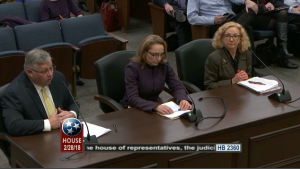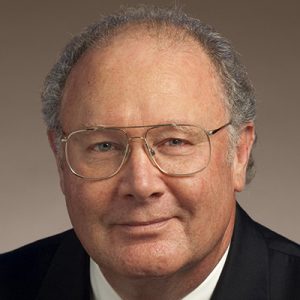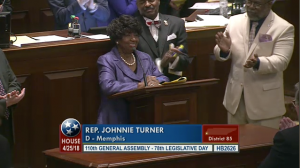TCOG’s 2018 Legislative Report
Following is TCOG’s 2018 legislative report on changes related to public records and open meetings. The 110th General Assembly of Tennessee adjourned April 25.
1 – Selection of state college presidents (HB 2000 / SB 2586)
A requirement in the law to reveal the names and applications of candidates for president at state colleges, including University of Tennessee, was changed to allow search committees to make public “up to three” finalists instead of requiring disclosure of “no less than three.”
The effect is that college search committees now have the option of recommending to a governing board as few as one person as finalist for president. Only the finalist or finalists are public.
The minimum amount of time between when the finalist or finalists are available to the public and when the governing board votes on a new president is the same: 15 calendar days.
The law surrounding confidentiality of presidential candidates can be traced to 2012 when an exemption was created for application materials that could identify candidates for college president or chancellors. The 2012 law stated that a search committee must select at least three finalists whose identities and application materials would be public before a vote by the governing body and all others could be confidential.
The reasoning given by proponents this year to expand the confidentiality is that some of the best applicants will not apply if their name becomes public in a pool of three finalists. If they do not get the job, they fear their public candidacy would hurt them in their current position.
The change in 2018 allowing the search committee to select “up to three” finalists applies to the positions of:
- president of the University of Tennessee system (1 position);
- president of locally governed state universities (6 positions);
- president of the state’s community colleges (13 positions); and
- president or director of Tennessee colleges of applied technology (27 positions).
This new provision comes with stipulations:
- It is automatically repealed in three years on July 1, 2021, and absent other changes, the law would revert back to its previous status.
- By Nov. 1, 2010, the Advisory Committee on Open Government must submit a report to the governor, the speakers of the senate and the speaker of the house of representatives “evaluating the impact and effectiveness” of the new provision and “identifying considerations and recommendations relative to its continuation, revision, or expiration.”
- Prior to initiating a president search, the college’s governing board must hold a meeting to establish “the search process, a timeline, and a statement of qualifications for the position.”
- At least seven calendar days before the governing board votes, the governing body must hold a public forum with the candidate.
The legislation originated through separate efforts of Gov. Bill Haslam and House Education and Administration Planning Committee Chairman Harry Brooks, R-Knoxville, both of whom said they thought the change was necessary to get the best candidates.
Brooks also sought to allow candidates for school district superintendents to be confidential. Brooks dropped the school superintendent portion, and modified one of his bills in consultation with Haslam.
He also included portions requested by TCOG and the Tennessee Press Association for an assessment of the exemption’s impact and a repeal in three years.
2 – Size, accountability of University of Tennessee Board of Trustees (HB 2115 / SB 2260)
The governing body of University of Tennessee’s Board of Trustees was reduced to 12 members from 26 and the positions were reconstituted, eliminating the ability of faculty to serve on the board, for example. A new provision requires that board members must be confirmed by joint resolution of the senate and the house. Also new: the general assembly may remove a board member upon two-thirds vote for “misconduct, incapacity, or neglect of duty.”
The legislation was a major initiative of the Haslam administration and succeeded despite testimony before several house and senate committees from alumni, and faculty and student representatives. While the bill passed, the measure scraped through the House in a divided floor vote of 51-41.
See news coverage of the divided vote, when one senator called the legislation a “tough piece of bear meat,” and a variety of columns and news after finally approving the bill, the legislature rejected some of Haslam’s nominees to the new smaller board.
3 – Meetings, reports by Advisory Committee on Open Government (HB 2287 / SB 2152)
The law regarding meetings and activities of the Advisory Committee on Open Government (ACOG) was updated to allow the committee to select co-chairs and allow the co-chairs to call meetings “at any time” or at the request of a majority of the members.
Previously, the committee met only at the request of the Office of Open Records Counsel.
ACOG is a 14-member committee appointed by the Comptroller’s office whose purpose is to advise the Office of Open Records Counsel. It also is allowed to review and provide written comments on proposed legislation to the General Assembly regarding open meetings and open records laws.
Modifications to the law:
- Requires the committee to meet at least one each calendar year, and requires meetings to be open to the public and subject to the Open Meetings Act.
- Requires that the advisory committee provide reports on open records and open meetings laws and issues as requested by the governor or any committee of the general assembly.
- Clarifies that the committee would only review proposed legislation “if requested.”
- Requires that any written comments or reports by the advisory committee have “unanimous consent of the co-chairs.”
- Requires separate detailed reports of activity from the Office of Open Records Counsel and the advisory committee; currently the Open Records Counsel and advisory committee are required to provide a joint report. Also requires reports go to the governor, the speaker of the house and of the senate, and to the chairs of local and state government committees.
The bill was carried by Sen. Mike Bell, R-Riceville, and Rep. Bob Ramsey, R-Maryville and was intended to allow the advisory committee to become a more functional group useful to the General Assembly.
See TCOG column: Lawmakers give Advisory Committee on Open Government new life.
4. State agency rules on access to public records (HB 1608 / SB 1724)
An update to §T.C.A. 10-7-503(g) that requires government entities to adopt public records policies with minimum requirements now requires that state governmental entities promulgate rules in accordance with the Uniform Administrative Procedures Act to meet those requirements.
The change for state agencies restores oversight by the Joint Government Operations Committee that had been removed when §T.C.A. 10-7-503(g) was passed in 2016.
Going forward, each state agency must revert to its previous practice and go through the rule-making process. Under this process, the public has a chance to comment and to request a public hearing on any changes. All rules must also go through the Joint Government Operations Committee, which can stay a rule.
The bill was carried by Sen. Mike Bell, R-Riceville, and Rep. Jimmy Matlock, R-Lenoir City, after a dustup over some of the policies in the Joint Government Operations Committee last year. Lawmakers were surprised when state agencies notified them that 2016 law had removed their oversight.
The update to the law allows current public records policies to stay in effect until new rules are adopted. It requires that state agencies promulgate rules regarding public records by Jan. 1, 2019.
5. Exemption for regulated hospital in East Tennessee (HB 2020 / SB 2048)
Certain records received by the Department of Health or Attorney General from recipients or applicants of a certificate of public advantage (COPA) are now exempt from the public records act.
The bill was aimed at the records of Ballad Health, which was created through a merger of two East Tennessee hospital systems under a new state regulatory framework.
As part of the state’s oversight, Ballad Health, operating under the state’s only COPA, must share extensive records with the state.
The exemption makes confidential many of those records, including operating and capital budgets, future business plans, audit working payments, payor contracts and payor pricing information, physician recruitment plans, contracts and agreements; complaints and investigations of complaints, and employee personnel files.
If the state intends to disclose any of those records through the course of its regulation, it must notify the holder of the certificate of public advantage (Ballad), which may petition the department for a declaratory order as set out in the Uniform Administrative Procedures Act to determine if the disclosure would cause the loss of a trade secret. Records subject to the petition would not be disclosed by the state until the review process is complete.
The bill was carried by Sen. Rusty Crowe, R-Johnson City, and Rep. Gary Hicks, R-Rogersville.
See news coverage from the Johnson City Press and WJHL.
6. Exemption for radioactive materials, artifact sites (HB 1815 / SB 2239)
The Tennessee Department of Environment and Conservation sought to clarify an exemption concerning records of radioactive materials regulated by the state. The new exemption replaces previous language and defines as confidential records “not available to the public under federal law, regulation, or guidance, or nuclear regulatory commission regulatory issue summary.”
The bill also added a new exemption to allow the department to keep confidential records “containing information regarding the specific location of a site or artifact if the commissioner or the commissioner’s designee determines that disclosure of such records would create a substantial risk of damage to or destruction of either the historical value of such site or artifact or private property.”
In explaining the bill on the House floor, state Rep. David Hawk said “several cases of looting and vandalism” at these sites over the years and the exemption would allow the state’s Division of Archaeology to keep the records confidential to prevent that.
7. Criminal penalties for releasing residential addresses of county corrections officers (HB 2014 / SB 1992)
One of the few areas of the law where a government employee can go to jail for releasing exempt public records was expanded this legislative session.
The law already makes it a Class A or Class B misdemeanor if someone releases residential addresses of a law enforcement officer that are in possession of the law enforcement officer’s employer. The person releasing the information must be found to be acting with criminal negligence or knowing the information is confidential and intentionally releasing it anyway.
This bill this year expanded the criminalization to encompass release of county corrections officer home addresses. The bill was carried by Sen. Jack Johnson, R-Brentwood, and Rep. Sam Whitson, R-Franklin.
8. Redline changes to proposed rules (HB 2437 / SB 1573)
A simple measure, but important for those who track changes in state agency rules, a new law requires state agencies to make proposed rule changes available in redline form to the members of the public attending a public hearing related to the rule change.
In explaining the bill in committee, Sen. Mike Bell, R-Riceville, said a few years ago, the law was updated so state agencies were required to give lawmakers who were hearing their rules a redline version.
Some business organizations were having a hard time identifying all the proposed changes, so Bell decided it would be beneficial for the agencies to provide the same redlined copies to the public.
9. Proprietary records held by food-based incubation service provider (HB 2213 / SB 2049)
This legislation arose after the city of Unicoi established a food-based incubation service provider named Mountain Harvest Kitchen to stimulate the growth of food-based businesses.
The city sought an exemption of the incubation service provider’s records. The bill was modified and what passed allowed for proprietary information, trade secrets or marketing information in records received from private businesses by the government entity to be confidential.
The exemption also states that proprietary information does not include “lease agreements with the incubation service provider, the identity of businesses or persons using the incubation service provider’s services, amounts paid to the incubation service provider by businesses or persons for use of facilities or for other services, or financial records of the incubation service provider.”
See some news coverage in the Erwin Record.
10. Access to TBI records investigative records by committee studying unsolved civil rights crimes (HB2626 / SB2630)
Rep. Johnnie Turner, D-Memphis, led legislation that allows an ad hoc legislative committee appointed to study unsolved civil rights crimes access to investigative records of the Tennessee Bureau of Investigation related to those crimes.
TBI records are confidential except in a few instances, such as by court order or when they involve a shooting death caused by a law enforcement officer.
In this case, the ad hoc legislative committee can have access to records of unsolved civil rights crimes from the period of 1938 and 1975 if a majority of its entire membership votes to direct the TBI to allow access.
“This means a lot to me and it means a lot to the families,” said Turner, a Memphis Democrat who acknowledged that this was her last bill. Turner announced her retirement earlier this year. “We can now bring closure to the pain that they have suffered from some loved one being lynched or hung and all of the other terrible things that happened to my people simply because of the color of their skin.”
See video from Turner’s presentation on the bill and her outgoing comments as colleagues gathered around.
Bills that failed
1. Effort to make autopsy records confidential (HB2360 / SB2572)
A bill to make government-conducted autopsy reports and findings confidential was taken off notice by its sponsor, Rep. Eddie Smith, R-Knoxville after initially passing the House Health Subcommittee with unanimous support.

John Lott with the Knox County Regional Forensics Center, Dr. Darinka Mileusnic-Polchan, the county medical examiner for Knox and Anderson counties, and State Chief Medical Examiner Julia Goodin, tell lawmakers while they want to make confidential state and county autopsy reports.
Smith said that Dr. Darinka Mileusnic-Polchan, the county medical examiner for Knox and Anderson counties, had asked him to carry the bill to protect the medical privacy of family members of the deceased that might be revealed in the deceased’s autopsy. However, the bill went much farther than that and made all autopsy records confidential.
Mileusnic-Polchan is chair of the Tennessee medical examiner advisory council. She testified at the subcommittee hearing about the bill about why she thought all the records should be confidential. (It’s worth watching the video for her remarks as well as testimony from the State Chief Medical Examiner.)
After pushback on the bill, including an editorial by Knoxville News-Sentinel Editor Jack McElroy, Smith took the bill off notice.
The Senate sponsor, Joey Hensley, R-Hohenwald, a county medical examiner himself, also pulled his bill, noting that he believed government autopsy reports should be open and that the state’s autopsy law already exempts the medical record of the deceased unrelated to the cause of death.
Read some of TCOG’s coverage here.
2. Effort to require executive branch members who lobby to register (HB 2343 / SB 2291)
A bill to require employees of the executive branch of government who lobby members of the General Assembly on legislation to register as lobbyists was killed in a Senate committee.
The bill would have required registration but exempted executive branch employees from paying lobbyist fees.
After the bill was killed in a Senate committee, state Rep. Bill Sanderson, who is vice chair of the House State Government subcommittee and who originated the bill, made a short speech and promised to bring back the bill again next year. See also video in the Senate committee to understand the opposition.
3. Political advertising on social media (HB 1847 / SB 1635)
An effort by Sen. Jeff Yarbro, D-Nashville, and Rep. Jason Powell, D-Nashville to specifically include expenditures on social media in the state’s political advertising disclosure law failed in the House for lack of votes.
Most questions from lawmakers had to do with someone paying to “boost” a post on Facebook.
Currently, the law requires anyone making an expenditure for the purpose of “financing a communication that expressly advocates the election or defeat of a clearly identified candidate” to include the payor’s identity in the ad. The law refers to ads that appear on a “broadcast station, newspaper, magazine, outdoor advertising facility, poster, yard sign, direct mailing or any other form of general public political advertising.”
The bill would have added “social media platform” to the list and included a provision that allowed someone to put the disclosure on a profile page, or hyperlink to a website containing the disclosure if it was impractical to put the disclaimer directly on the ad itself.
Yarbro said that he believed under current law that social media is implicitly included, but the law would make it explicit. However, in answer to a question from a fellow senator, he said he knew of no court or AG’s opinion that stated such.
The bill had passed in the Senate with 17 voting in favor, but many senators not voting.
4. Effort to require two votes for county commissions to raise property taxes (HB2395/SB2290)
A bill that would have required a county commission to hold two votes to raise property taxes and provide more notice to the public about its intentions failed.
The bill, which drew concerns from the Tennessee County Commissioners Association and Tennessee County Services Association, was sponsored by outgoing Rep. Courtney Rogers, R-Goodlettsville, and Sen. Mike Bell, R-Riceville. The lawmakers told committee members that they wanted the public to have an adequate chance to know when a significant property tax was to be voted upon. But details in the bill were unable to worked out before the legislative committees ended their work for the year.








